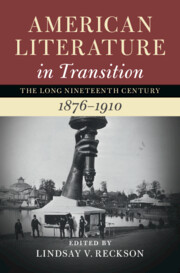Book contents
- American Literature in Transition, 1876–1910
- Nineteenth-Century American Literature in Transition
- American Literature in Transition, 1876–1910
- Copyright page
- Contents
- Contributors
- Series Preface
- Acknowledgments
- Chronology
- Introduction
- Part I Transitive States
- Part II Post-Reconstruction Aesthetics
- Part III Old Materialisms
- Part IV Immanent Techniques
- Chapter 15 Frances Harper’s Reconstruction
- Chapter 16 Emma Lazarus’s Cosmopolitanism
- Chapter 17 Henry James’s Temporalities
- Chapter 18 Charlotte Perkins Gilman’s Pragmatism
- Chapter 19 Nicholas Black Elk’s Cosmology (or, Post-Reconstructing Black Elk)
- Index
Chapter 16 - Emma Lazarus’s Cosmopolitanism
from Part IV - Immanent Techniques
Published online by Cambridge University Press: 24 August 2022
- American Literature in Transition, 1876–1910
- Nineteenth-Century American Literature in Transition
- American Literature in Transition, 1876–1910
- Copyright page
- Contents
- Contributors
- Series Preface
- Acknowledgments
- Chronology
- Introduction
- Part I Transitive States
- Part II Post-Reconstruction Aesthetics
- Part III Old Materialisms
- Part IV Immanent Techniques
- Chapter 15 Frances Harper’s Reconstruction
- Chapter 16 Emma Lazarus’s Cosmopolitanism
- Chapter 17 Henry James’s Temporalities
- Chapter 18 Charlotte Perkins Gilman’s Pragmatism
- Chapter 19 Nicholas Black Elk’s Cosmology (or, Post-Reconstructing Black Elk)
- Index
Summary
In a 1998 essay, “Cosmopolitan Patriots,” Kwame Anthony Appiah recalls his father, “a Ghanaian patriot,” who believed that Ghana was worth dying for, but he also loved the broader region of Asante, a kingdom ultimately absorbed within a British colony that “he and his father also both loved and served”; as well as that “enchanting abstraction,” “Africa.” When his father died, Appiah tells us, he left an unfinished note to his children reminding them of their double ancestry – in Ghana and England – writing, “‘Remember that you are citizens of the world,’” by which he meant “wherever [they] chose to live,” so long as they left that place better than they found it.1 Appiah describes his father’s worldview as one of “rooted cosmopolitanism,” or “cosmopolitan patriotism.”2 The cosmopolitan patriot sees a world in which “everyone is a rooted cosmopolitan, attached to a home of his or her own, with its own cultural particularities; who accepts “the citizens’ responsibility to nurture the culture and politics of their homes,” but who also celebrates the variety of human cultures in the world.3 With this notion of “rooted cosmopolitanism,” Appiah gives us a model that, born out of a colonial project and the multiple national affinities engendered by colonial violence, helps us to understand the work of the late-nineteenth-century American poet, Emma Lazarus.
- Type
- Chapter
- Information
- American Literature in Transition, 1876–1910 , pp. 299 - 323Publisher: Cambridge University PressPrint publication year: 2022



